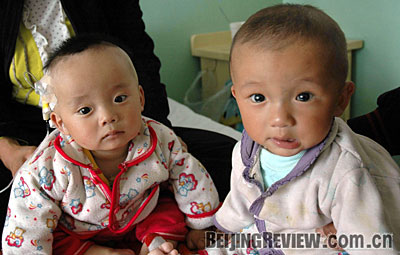|

DOUBLE THE PAIN: Twins from Minxian County, west China's Gansu Province, are diagnosed to develop kidney stones by drinking tainted milk and get treatment in a hospital in Lanzhou, the capital city of the province (ZHU GUOLIANG)
It's 1:00 p.m. on September 22 at Beijing Children's Hospital. The outpatient section is packed with panic stricken parents and grandparents who have brought their infants along to be examined in the nation's tainted milk scandal.
Parents took numbers on the first floor and then queued in the hall to await their babies' tests, including urinalysis and ultrasonic scans, all totally free. The milk supplies in question are known to cause kidney stones in infants.
"I brought my grandson for testing immediately after I heard the news of the tainted milk," said Hu Yueqin, 59, who is from east China's Anhui Province and is now living in Beijing with her son and daughter-in-law, migrant workers. Her one-and-a-half-year-old grandson has already drunk Shengyuan milk powder for four months, some batches of which were on the government's contamination list.
"Her mother had no milk after giving birth to him, so that (infant formula) is our only choice," said Hu, adding that they have already changed to Dumex, an imported brand. "A box of Dumex is more than 150 yuan ($21.4), while Shengyuan is 90 yuan ($12.8), but it is not the time to care about the prices," she said.
Hu's voice was echoed by another woman surnamed Fan, whose 10-month-old daughter drank Shengyuan milk powder for two months. "I feel very uncomfortable about this scandal. Raising a kid is an extremely difficult task, and it's difficult to imagine that (tainted) milk powder can make all the efforts in vain," said Fan, who chose the brand after seeing the adverts on China Central Television. Fan, 26, from Henan Province, now stays at home specially to care for her child.
Low-income families occupy a large proportion of the consumers of domestic milk powder, which is much cheaper than the imported brands. Sanlu milk powder, at the center of the scandal, is cheaper than many other domestic brands and is always the first choice of low-income families since the producer, Sanlu Group Co. Ltd. of Hebei Province, is a time-honored brand with 50 years of history.
"The concern now is that many poor families live in remote areas and are not well-informed. Some might not even know about the scandal, not to mention getting tested and properly treated in time," said Shen Ying, Deputy Director of Beijing Children's Hospital.
As the largest comprehensive children's hospital in China, Beijing Children's Hospital has been very busy in offering the medical tests.
On September 22, Beijing Children's Hospital accepted more than 2,300 infants for tests and stopped accepting newcomers at 4:00 p.m. since the ultrasonic machines, which are used for checking for kidney stones, were all running at full capacity. "We've already borrowed several ultrasonic machines from other hospitals since the number of infants for testing increases daily," said Shen.
Fan's daughter was found not affected by the milk powder, as did the majority of children coming for the tests. "I think I am just lucky that I did not choose Sanlu, but I will be careful of everything my daughter eats or drinks in the future, but who knows what will come next."
Compared with the crowded outpatient section, the Beijing Children's Hospital medical wards are quiet. Corridors are locked with only doctors and nurses having access. Those children found with kidney stones undergo treatment here.
At 2:00 p.m. on September 23, half an hour before visiting time, parents of affected children wait anxiously at the gate of a locked medical ward corridor.
"My son has stayed here for several days due to the kidney stones, but we are still very eager to see him," said Li Shuqiang, a waiting parent. Coming all the way from Hebei, Li and his wife stay in a small inn nearby the hospital to be close to their 10-month-old son. "We cannot stay long since we have to go back home to work, and now we are not sure how long my son should stay here," said Li.
Since the scandal broke, Beijing Children's Hospital has already received more than 100 infants with kidney stones or kidney failure. Shen said for those children with small kidney stones who show no symptoms of fever or reduced urine, the stones can be flushed out of the body naturally by drinking more water. "Only those children with less urine than normal or who don't urinate at all should stay in hospitals for further treatment. Now, all the children in Beijing Children's Hospital are getting effective treatment and improving," she said. | 